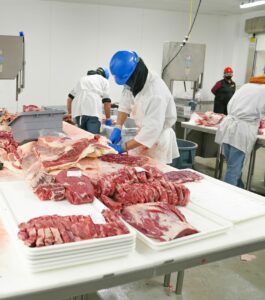Investigating the impact of anti-microbials on responses of key pathogens and microbial communities in processed meat for enhanced microbial safety and shelf-life.
To meet consumer demands of meat products that are free from synthetic preservatives, researchers are exploring the impact of adding natural anti-microbials in order to influence the microbiome of meat to ensure safety and extend shelf-life.
*This research project is supported by the Teagasc Walsh Scholarship Programme (Project 2020030)
The challenge
Food industries face significant challenges in the coming years to open up new export markets and manage increasing trade competition in both domestic and export markets from global players in the sector. Assured food safety is a prerequisite to economic success, brand reputation and to export market access. Moreover, consumers demand ‘clean label’ food products that are free from synthetic preservatives. As a result, innovations are needed to meet the expectations of consumers by reformulating food products and adding natural anti-microbials in order to influence the microbiome of meat to ensure safety and extend shelf-life.
Our response

Meat processing. Credit – Mark Stebnicki
Microbiome researchers are exploring opportunities for enhancing microbial safety and extended shelf life of selected processed beef products (beef burgers), based on use of natural anti-microbial agents and their impact on the microbiome of beef burgers. Following initial testing and selection, the natural anti-microbial agents were subsequently added to processed beef products containing a natural microbiome and inoculated with key pathogens (Shigatoxigenic E. coli and Listeria monocytogenes), and stored under typical industrial and retail conditions. The impact of several anti-microbial agents on pathogen survival, shelf-life, as well as the impact on the microbiome composition were assessed using metagenomics approaches.
Researchers will focus on establishing a model system to examine the specific interactions between the selected pathogen and the model microbiome, and their gene responses when challenged with natural anti-microbials using a transcriptomics approach. This project will advance the scientific knowledge on how the processed beef ecological system impacts on shelf life and safety when natural anti-microbial agents are used. The outcome will support research and innovation in the processed meat and wider food sector.
Collaborative partners
University College Cork, Teagasc, The Agriculture and Food Development Authority, Ireland
The team
Angelos Papadochristopoulos – PhD student at the University College Cork (Teagasc Walsh Scholarship) supported by the Teagasc Walsh Scholarship Programme (Project 2020030).
Dr Geraldine Duffy – Senior Principal Research Officer, Head of Food Safety Department, Teagasc
Dr Narelle Fegan Principal Research Scientist, Food Microbiology
Dr Kaye Burgess – Senior Research Officer, Teagasc
Professor Joseph Kerry – Food Packaging Group, School of Food & Nutritional Sciences, University College Cork (UCC)
Dr Lesley Duffy Team leader, Applied Microbiology
Dr Penny Galbraith CERC Postdoctoral Fellow, Applied Microbiology
Dr Jess Gray – Postdoctoral Fellow, Food Microbiology
Glen Mellor – Senior Experimental Scientist, Applied Microbiology
Sean Moore – Experimental Scientist, Food Microbiology
